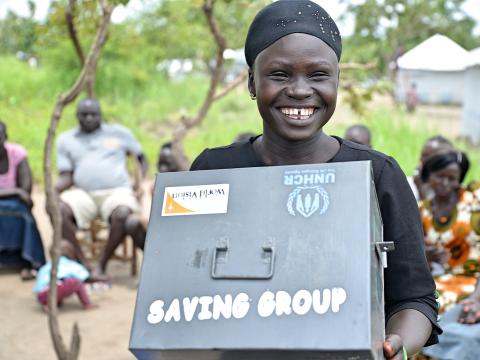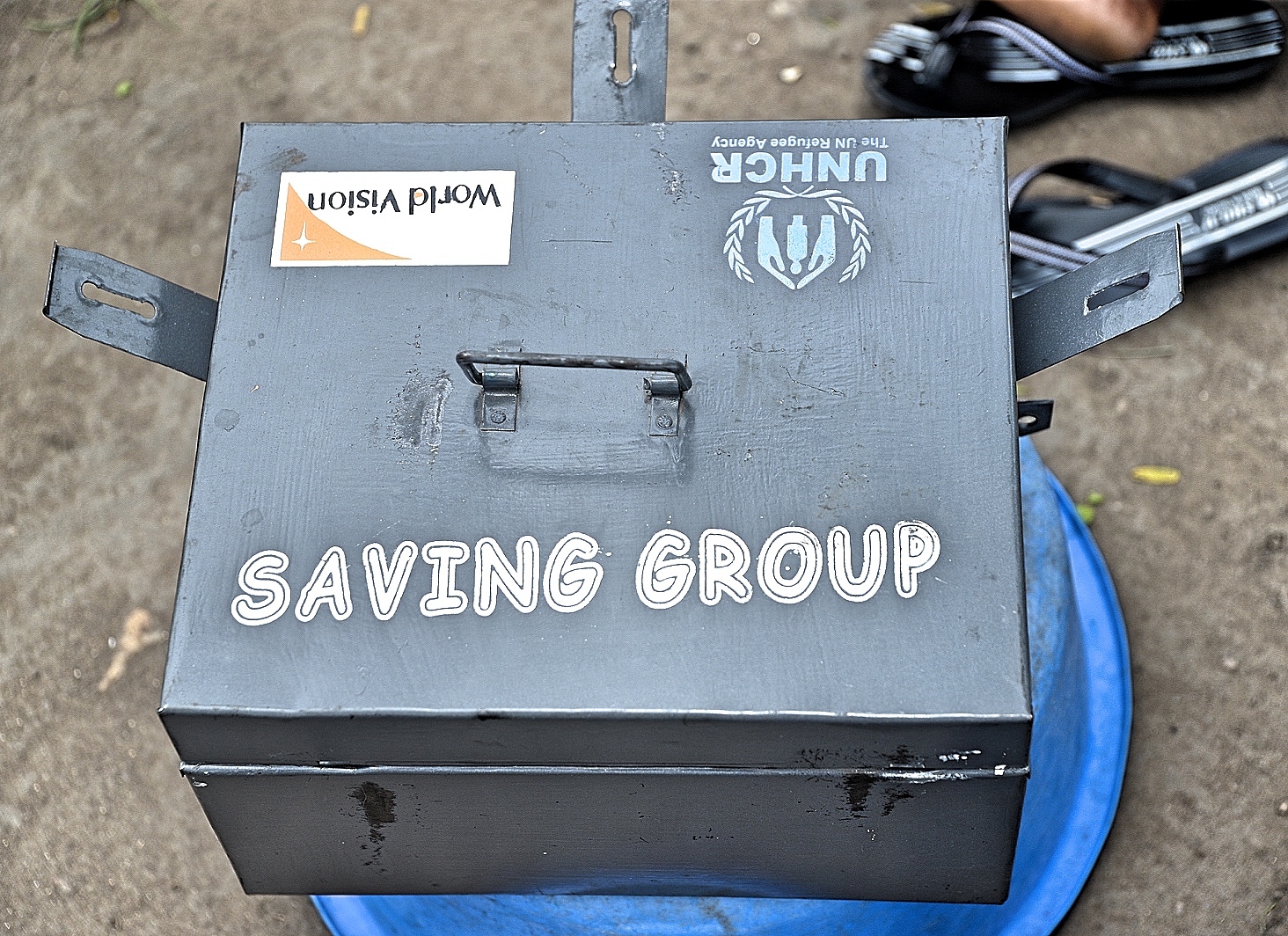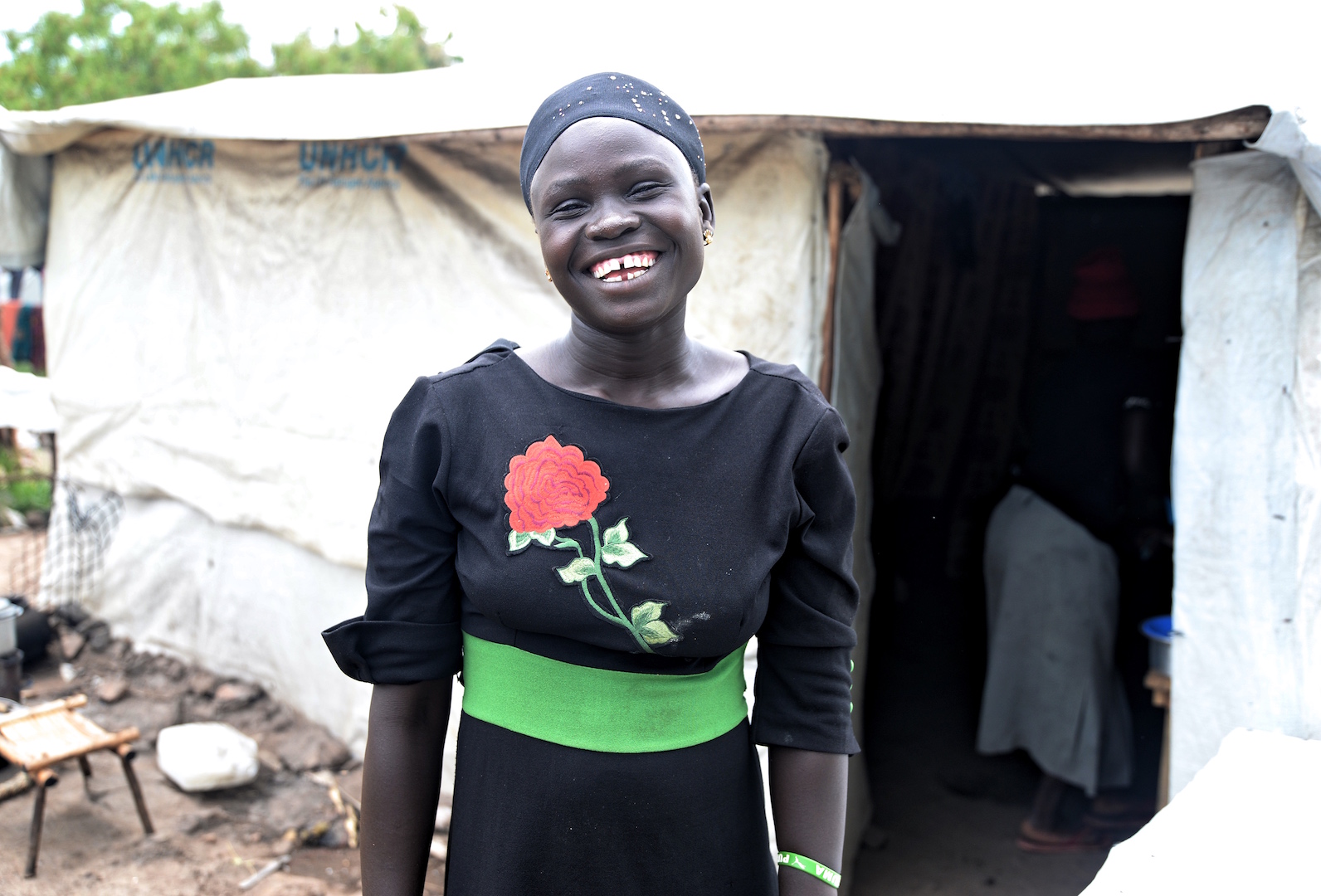How to set up a small business in a refugee settlement

It was only $18. That’s all Joyce needed to start her restaurant.
Every day she is pouring cups of tea and serving plates loaded with meals of beans, fish and rice or beef and ugali – a traditional Ugandan dish made of corn meal – in a busy trading centre in one of the country’s newest towns. Her customers are aid workers on lunch break, refugees tired of cooking for themselves or young people stopping to linger and chat.
Business is booming for Joyce, who has lived in Uganda for less than a year.
Joyce is among the one million refugees who have escaped conflict in South Sudan. She’s a 23-year-old single mother of three.
Arriving with just cooking pans
“I had been operating a small restaurant in South Sudan so I managed to escape with my cooking pans and a few other items. All I needed was some capital to buy food items plus ingredients.’’ Joyce explains.
Joyce arrived in Uganda suddenly single, her husband killed in the conflict destroying her homeland. She says she found life unbearable here, tasked with taking care of three children and struggling to rely on rations.
Joyce lives in Imvepi, a community of more than 100,000 refugees that was established in February 2017.
“I saw very many business opportunities around the settlement but I lacked capital,” Joyce says.
Joining a savings group
When a village saving agent approached her, Joyce did not hesitate to enrol in a savings group.
“We had similar savings groups back home in South Sudan so I had an idea about how they operate,’’ Joyce adds.
Joyce says for the first two months, she had to sell part of her family food ration to contribute to the saving group.
‘’Every week we save UGX2,500 (USD$0.71) per member. It’s hard to find that money around here because most of the people have no income generating activity. So what most members do is to sell part of their monthly rations.” Joyce adds.
Taking out an $18 loan
After two months of saving, Joyce qualified to get a loan of UGX50,000 ($18 US) from her 30-member strong savings group.
‘’With this money I was able to buy various food items, cooking oil, salt, ingredients, and a few plastic plates that I needed to start up an eating place at the market. I got some free tarpaulins, bought a few wooden poles and put up a small structure to act as the eating place for my customers’’ Joyce adds.
After just two weeks of running her eating joint, Joyce managed to clear the loan repayment.
On a good day, Joyce will make $8 US (30,000 UGX) in profit, although most days it’s just $4 (15,000 UGX). She’s planning to take out another loan expand her business.
Ensuring saving group members are successful
Each savings group starts when World Vision identifies and trains village agents in financial literacy, saving methodology and business management.
The agents are then tasked to move across the refugee settlement to sensitize people and register those who are willing to form groups.Refugees and host community members are asked to form joint saving groups of not more than 30 members each.
“The rationale is that refugees must make up at least 75 per cent of members in each group. The group members are then assessed by World Vision and also trained in financial literacy, saving methodology and business management,” says Victor Ajuma, World Vision’s resilience and livelihoods officer in the West Nile region.
Each group is supported with start-up kits such as metallic saving boxes, passbooks, record books, pens, calculators, stamp pads and rulers. Members then agree on the amount of money to save per week. The minimum savings per week for each member is UGX2000 (USD$0.95) and maximum UGX10,000 (USD$3).
Another success story – the fresh vegetable seller
Mary Tiju is a single mother of nine whose husband was also killed in the South Sudan conflict. She too lives in the Imvepi refugee settlement.
She too took out a UGX50,000 (USD$18) loan from her savings group. With the money Mary opened up stall selling fresh foods at the local market.
‘’I was struggling to provide my children’s needs plus to feed them. But now I make a daily net income of at least UGX3500 (USD$1). My children can get books, pencils, sandals, and are able to change their diet once every week.’’ Mary explains.
More than 1,800 other people benefiting
According to World Vision’s Victor Ajuma, there are 60 savings groups that have been formed, with more than 1,800 refugees and host communities’ members at Imvepi refugee settlement.
‘’There is a very high demand for more savings groups from both refugees and host communities. Our plan to reach as many people as we can with the limited resources available. We are also looking at linking these groups to private sector entities like banks to enable them access more credit ‘’ Victor explains.
Between June and August 2017, the total cumulative savings for the 60 groups at Imvepi refugee settlement alone is $7,142 (UGX25Million).
Need to further expand saving groups
A recent livelihoods assessment report done by World Vision found that there is a need to promote economic activities among the refugee and host communities to boost income and self-reliance.
The report also found out that some of the refugees had shops in South Sudan and thus understand how to run businesses. The report recommended that Interventions to support restarting former livelihoods are needed to bring the refugees back to self-reliance and participate in the market economy.
World Vision is partnering with the UNCHR to document best practices and look at ways to further expand the programme, if funding becomes available.

